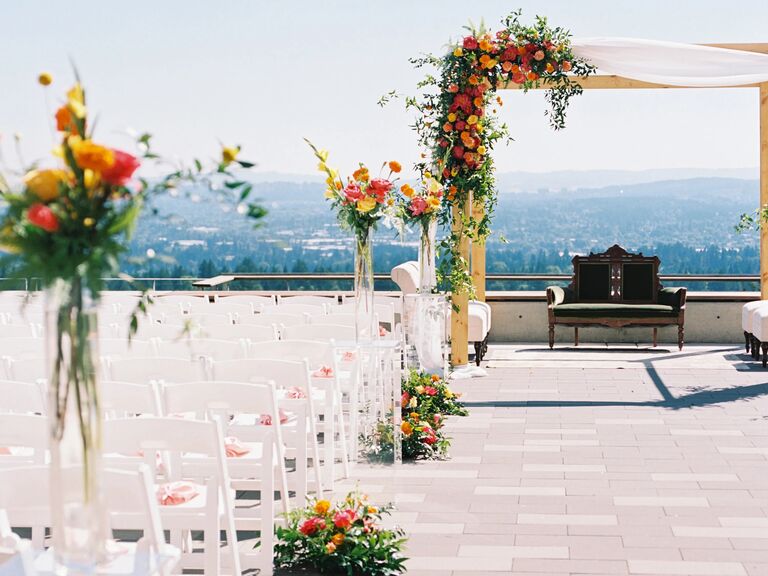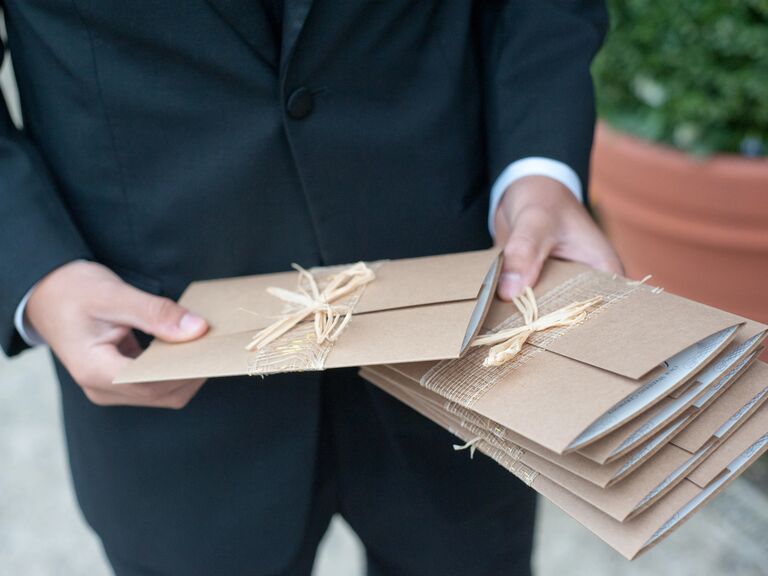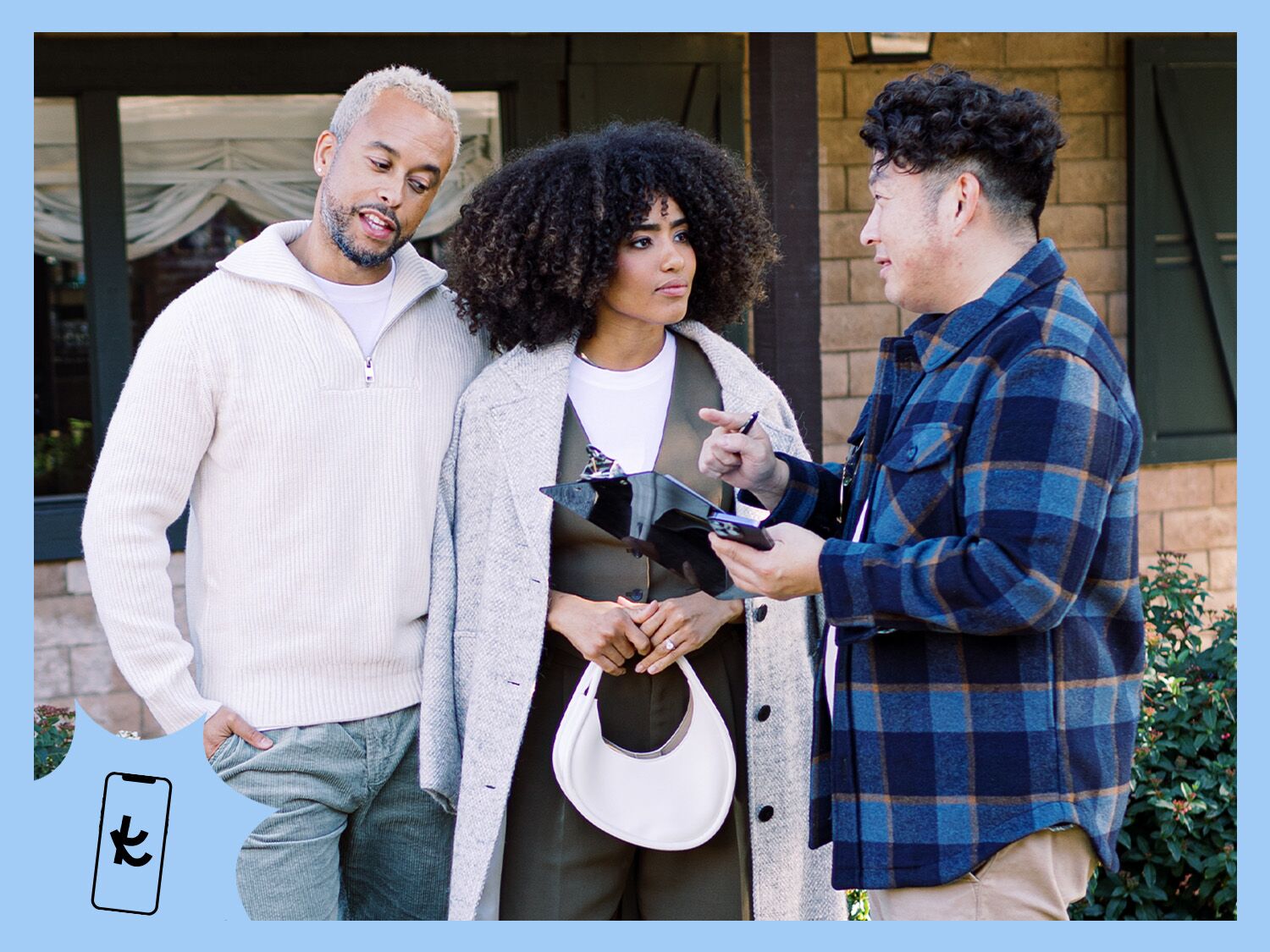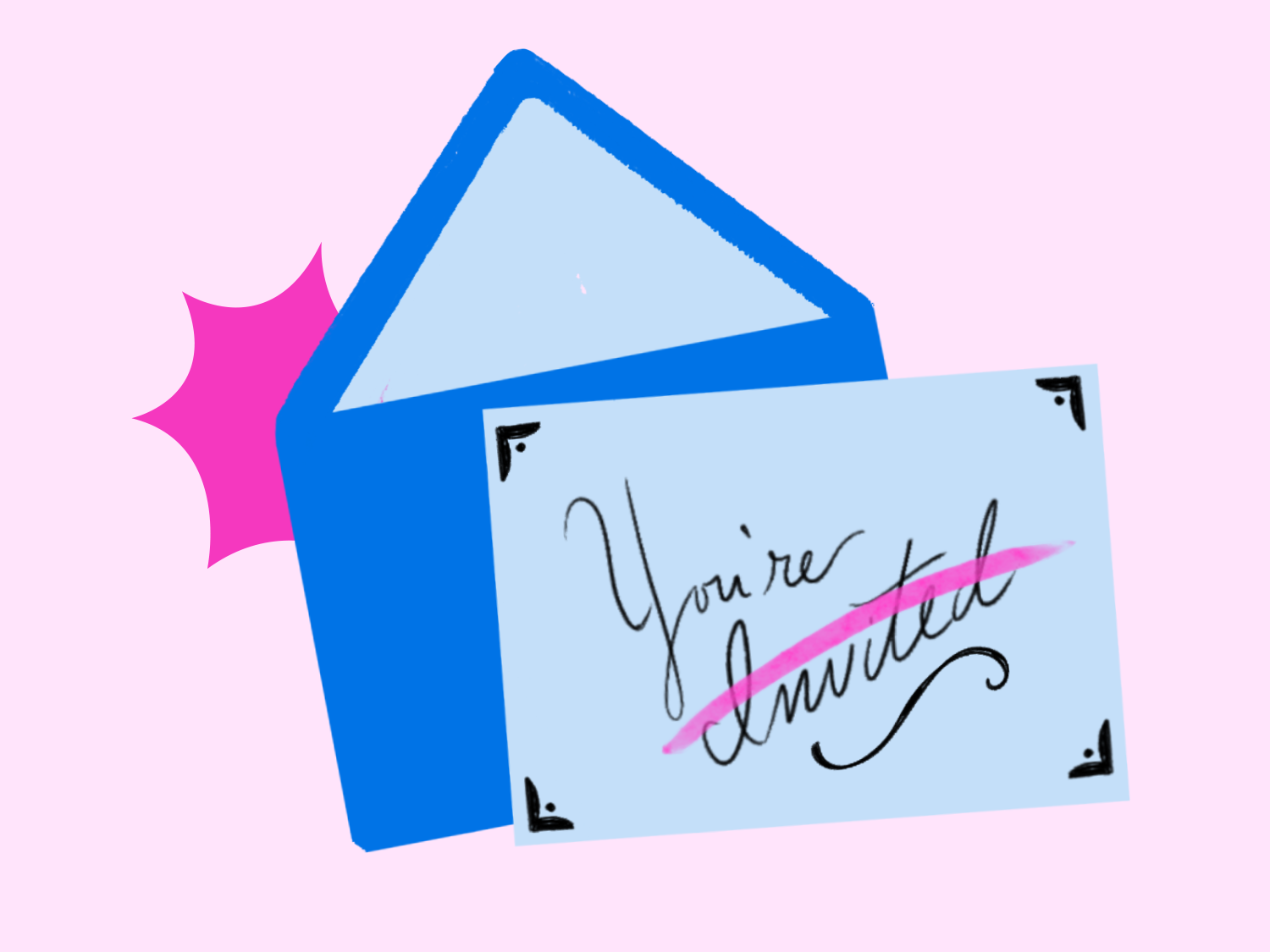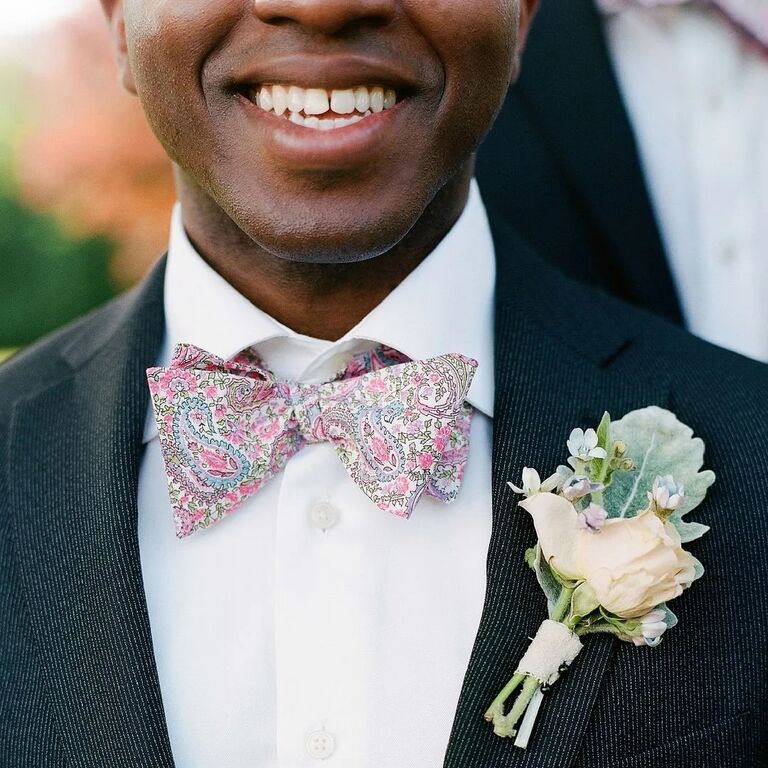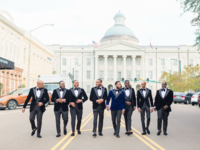What Does an Usher Do at a Wedding? We Explain the Job in Detail
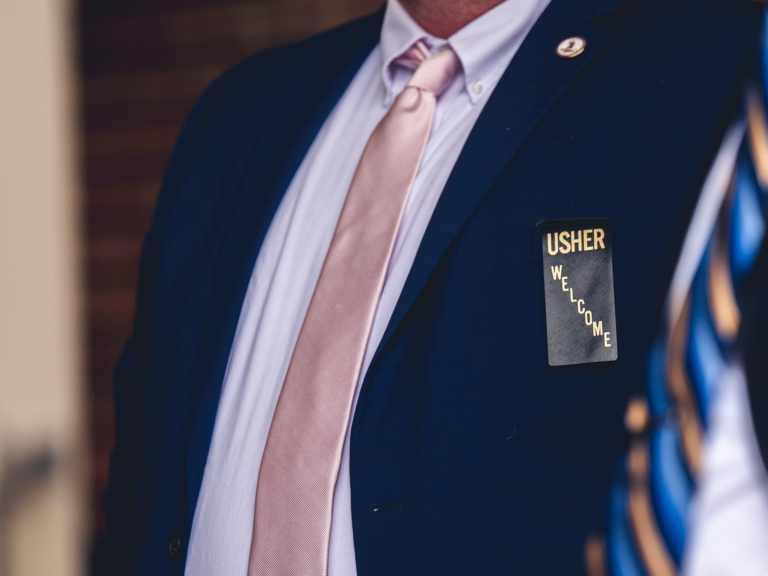
For many couples, assigning the role of wedding usher may be an afterthought—or a question mark. But what are wedding ushers? Most people assume that their main responsibility is ushering guests—and while that's true, that's only one of the duties of an usher at a wedding. After all, they help create many of the guests' first impressions of the big day.
So, what does a wedding usher do? How many ushers are needed for a wedding? And, if asked, how do you be a wedding usher? We talked to wedding etiquette experts and consultants to answer all those questions and more. Ready to dive in? Here's everything you need about how to be a wedding usher.
In this article:
Wedding Usher Job Description
First and foremost: What is a wedding usher? A wedding usher is an individual who guides and escorts wedding guests around the venue and to their wedding seats before the ceremony, explains Sarah Anderson, a wedding consultant for Twickenham House and Hall. But are ushers part of the wedding party?
"Although they are not official wedding party members, an usher is an honored individual to the couple they want to include in their big day outside the wedding party," she answers. "Attending the rehearsal and dinner before the wedding day is a helpful way for ushers to gauge their scope of responsibility and envision the big day within their role."
The biggest difference between ushers and groomsmen is the duties—they can't be expected to assist with ceremony seating and guidance while they're getting ready and waiting to walk down the aisle. "While it's important to communicate with the ushers leading up to the wedding day on what's expected of them, they're usually there to help on the day of instead of assisting throughout the entire planning process," Kevin Dennis, a wedding expert and owner of Fantasy Sound Event Services adds.
Read on for a detailed list on how to usher at a wedding!
Wedding Usher Duties
So, what does ushering a wedding entail? From arriving well ahead of the ceremony to ushering guests to managing those (annoying) late arrivals, the usher's job at a wedding is to take care of small details to ensure a smooth event. Consider these key usher responsibilities at a wedding.
Arrive early.
One responsibility of the wedding usher role, according to Anderson, is to arrive at least one hour before the official start of the ceremony to greet guests, sign the guest book, and reserve their chairs for the ceremony.
"Throughout this hour, an usher is responsible for directing guests from their cars to the guestbook and gift table and escorting each guest to their seat for the ceremony," she continues. "Because wedding guests need guidance, an usher provides all directions and necessary information to guests before the ceremony and reception."
Manage the flow of guests.
Another way to think of an usher's role in a wedding is traffic control of guests, cars, you name it. Dennis says if the venue has designated parking or other restrictions, ushers should feel comfortable directing traffic and even lining up cars if necessary.
"Venues can be tricky or even have areas that are off-limits in some cases, so it's a great idea to have a few people who are able to show everyone around the property and make sure they stay on track in terms of your timeline," he says. "If you'd like your ushers to lend a hand with any wedding setup, make sure they're clear on where your florist, DJ, etc. needs to go."
Prepare guests for the ceremony.
According to Dennis, ushers should know exactly when to time the ceremony seating. As he notes, often, the guests will arrive and then head to an early cocktail hour, so the ushers must coordinate with one another on when they should announce that it's time to be seated.
"Guests aren't always going to head straight to the ceremony after an announcement. It might take them a little extra time to make their way over there," he says. "Ushers should be prepared to escort elderly guests as well, as well as anyone who may need some extra help accessibility-wise. This is also when they'll be handing out ceremony programs and pointing folks in the direction of the restrooms before the ceremony begins."
Handle late arrivals.
Unfortunately, there may be late arrivals or other disruptions to your ceremony. While an annoying truth of weddings, Dennis says ushers are great to have in this case, as they can direct any late guests to the seating in the back, or let them know where their reserved seats are.
Be the bad guy.
And by the bad guy, we mean they can handle any and all hiccups that come up. As an example, Dennis says an usher can help other loved ones be mindful of the photographer, especially if it's an unplugged ceremony. And if any kids get antsy during the ceremony, they can also help guide parents to a quieter place. "Additionally, if any of your family and friends get lost on the way to the venue, an usher can save the day and make sure that they get to the right place - even if the wedding has already started," he adds.
Wedding Usher FAQ
Like with many aspects of planning a wedding, most of the choices are personal ones. And no two weddings are ever exactly the same. These FAQs on wedding ushers will help a couple decide if they need wedding ushers, who to ask and how to manage their responsibilities:
Do you have to have ushers at a wedding?
The short answer? No. But it's a nice way to involve loved ones in the ceremony. Plus, including wedding ushers is a long-standing tradition (though it's sometimes overlooked when planning everything else), according to Kevin Dennis, a wedding expert and owner of Fantasy Sound Event Services. "Having people on your team who can do crowd control—especially in the case of large weddings—will be invaluable," he continues. "It saves you the stress of constantly communicating directions with friends or family members while you're getting ready for the ceremony, and you can trust that everyone will be guided to the right place in time for you to walk down the aisle."
Who should be the ushers at a wedding?
Anderson explains that though they cannot commit to the responsibilities of the wedding party, ushers still desire to participate in serving the couple on their big day. The role can be filled by immediate family, cousins, friends, in-laws, aunts, uncles, teenagers of significance or a friend. But it's choosing someone you know you can rely on is vital—and who won't skimp on their day-of wedding usher or usherette duties.
As for their ages, Dennis adds that ushers can be anywhere from teenagers to older adults. Sometimes, it's sweet to have your teenage cousin—and also your able-bodied 85-year-old grandpa. "It's important to note that your ushers will be dedicating most of their time to escorting guests before, during and after the ceremony, so make sure that your ushers are self-sufficient and can stay on top of their assigned duties without much guidance," he says.
How many ushers do you need at a wedding?
Although there is no magic number for wedding ushers, Anderson recommends a general rule: one usher for every 50 guests. "For those looking to maintain the tradition of having ushers, this margin ensures no guest arrives ungreeted and has direction for their next step at the venue," she says. "For small weddings, even with fewer than 100 guests, having two ushers is helpful to keep one another company throughout the day and guide guests."
How do you be a good wedding usher?
In addition to the wedding planner and/or coordinator, a wedding usher is kind of the eyes and ears of the ceremony. Because they'll be interacting with guests, they should be welcoming, friendly and respectful, always maintaining a positive and can-do attitude. Other nice-to-haves? Someone who's organized, discreet and quick on their feet to handle any issues that may arise. Ultimately, ushering at a wedding is all about being helpful and ensuring the ceremony runs smoothly.
Additional reporting by Shyla Watson

